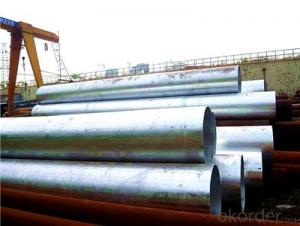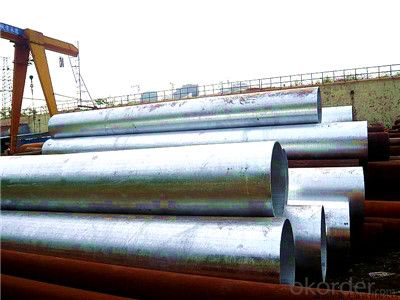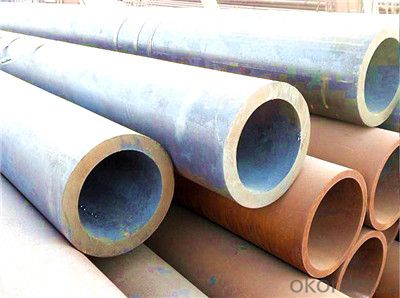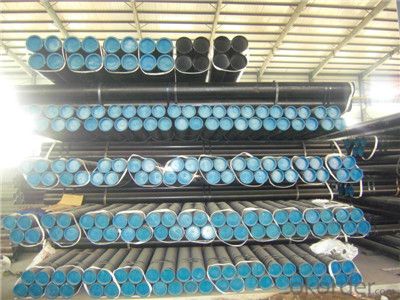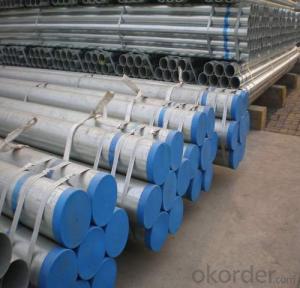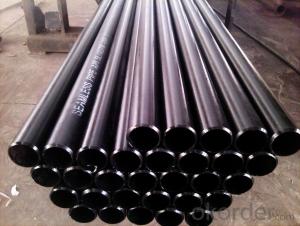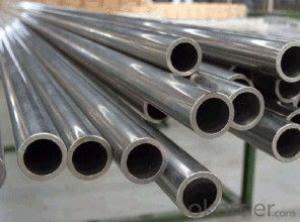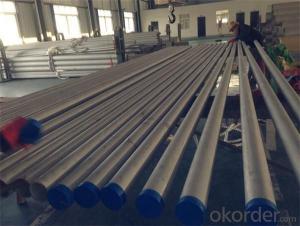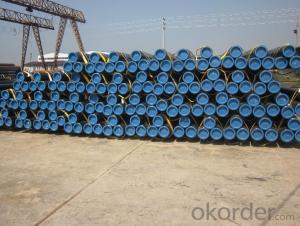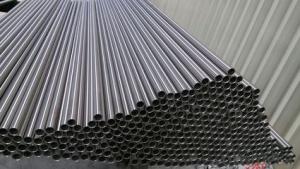Seamless Steel Pipe with Low Price and High Quality/Best Selling
- Loading Port:
- Tianjin
- Payment Terms:
- TT OR LC
- Min Order Qty:
- 50 m.t.
- Supply Capability:
- 2000000 m.t./month
OKorder Service Pledge
OKorder Financial Service
You Might Also Like
PRODUCT DETAILS
1.Structure of Seamless Steel Pipe Description:
A large amount of Seamless Steel Pipes is offered to the clients at cost effective rates. These pipes are extremely durable, resistant to corrosion and have high tensile strength. Our pipes are used in nuclear plants, power plants, refineries and construction industry across the country. Furthermore, we are capable of providing these seamless pipes to the clients in bulk quantity.
2.Main Features of the Steel Pipe:
• High manufacturing accuracy
• High strength
• Small inertia resistance
• Strong heat dissipation ability
• Good visual effect
•Reasonable price
3.Seamless Steel Pipe Specification:
| Standard: | GB, DIN, ASTM,ASME, ASTM A106-2006, ASTM A53-2007 |
| Grade: | 10#,20#, 45#, 16Mn |
Thickness: | 8 - 33 mm |
| Section Shape: | Round |
| Outer Diameter: | 133 - 219 mm |
| Place of Origin: | Shandong, China (Mainland) |
| Secondary Or Not: | Non-secondary |
| Application: | Hydraulic Pipe |
| Technique: | Cold Drawn |
| Certification: | API |
| Surface Treatment: | factory state or painted black |
| Special Pipe: | API Pipe |
| Alloy Or Not: | Non-alloy |
| Length: | 5-12M |
| Outer Diameter: | 21.3-610mm |
| Packaging Details: | Seaworthy packages, bundles wrapped with strong steel strip |
| Delivery Detail: | 15-30 days after received 30% TT |
4.Product pictures
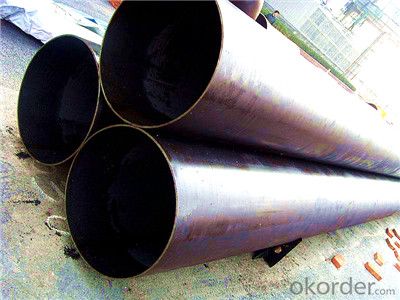
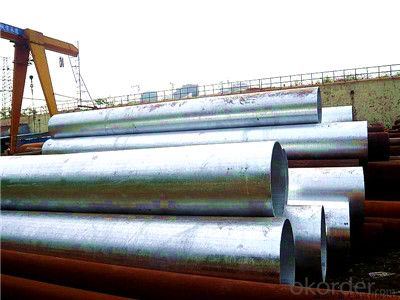
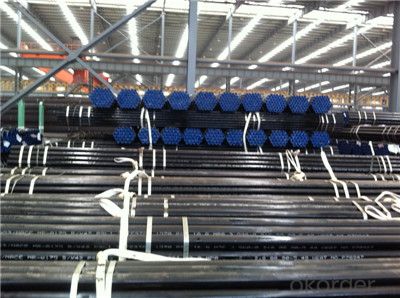
5.FAQ of Seamless steel pipe:
①How is the quality of your products?
Our products are manufactured strictly according to national and internaional standard, and we take a test
on every pipe before delivered out. If you want see our quality certifications and all kinds of testing report, please just ask us for it.
Guaranteed: If products’ quality don’t accord to discription as we give or the promise before you place order, we promise 100% refund.
②How about price?
Yes, we are factory and be able to give you lowest price below market one, and we have a policy that “ for saving time and absolutely honest business attitude, we quote as lowest as possible for any customer, and discount can be given according to quantity”,if you like bargain and factory price is not low enough as you think, just don’t waste your time.Please trust the quotation we would give you, it is professional one.
③Why should you chose us?
Chose happens because of quality, then price, We can give you both.Additionally, we can also offer professional products inquiry, products knowledge train(for agents), smooth goods delivery, exellent customer solution proposals.Our service formula: good quality+good price+good service=customer’s trust.
SGS test is available, customer inspection before shipping is welcome, third party inspection is no problem.
Any question, pls feel free to contact us !
- Q: What is the difference between API 5L and ASTM A53 steel pipes?
- API 5L and ASTM A53 steel pipes differ mainly in their specifications and intended applications. API 5L is a standard for seamless and welded steel pipes used for transportation of oil, gas, and water in the petroleum and natural gas industries. It specifies requirements for the manufacture of two product specification levels (PSL1 and PSL2) of seamless and welded steel pipes. On the other hand, ASTM A53 is a standard specification for seamless and welded black and hot-dipped galvanized steel pipes used for mechanical and pressure applications. While both standards have similarities, they have different scopes and requirements, making them suitable for distinct purposes in different industries.
- Q: How are steel pipes used in tunnel construction?
- Steel pipes are used in tunnel construction as structural elements to provide support and stability to the tunnels. They are commonly used in tunnel lining systems to create a strong and durable structure that can withstand the pressure and weight of the surrounding soil or rock. Steel pipes are also used for ventilation systems, drainage systems, and for carrying utilities such as water, gas, or electricity through the tunnel.
- Q: Can steel pipes be used for wastewater disposal?
- Yes, steel pipes can be used for wastewater disposal. Steel is a durable and corrosion-resistant material, making it suitable for transporting and disposing of wastewater safely and efficiently.
- Q: Can steel pipes be used for steam applications?
- Yes, steel pipes can be used for steam applications. Steel pipes are known for their high strength and durability, making them suitable for carrying steam at high temperatures and pressures. They are resistant to corrosion and can withstand the harsh conditions of steam systems, making them a popular choice in various industries such as power generation, oil and gas, and chemical processing.
- Q: Are steel pipes resistant to vibration?
- Yes, steel pipes have excellent resistance to vibration due to their high strength and stiffness properties. The inherent rigidity of steel makes it highly resistant to the effects of vibration, making steel pipes a reliable choice for applications where vibration is a concern.
- Q: What is the difference between steel pipes and copper pipes?
- Steel pipes and copper pipes differ in terms of their material composition, with steel pipes being made of steel and copper pipes being made of copper. Steel pipes are generally stronger and more durable, making them suitable for high-pressure applications and underground installations. Copper pipes, on the other hand, have excellent heat conductivity and corrosion resistance, making them ideal for plumbing and heating systems. Additionally, copper pipes are more expensive than steel pipes but offer better resistance to bacteria growth. Ultimately, the choice between steel and copper pipes depends on the specific needs and requirements of the application.
- Q: Seamless steel tube with the tube with what is the difference?
- Seamless pipe can withstand ultra-high pressure, of course, its wall thickness will increase, which needs to be designed according to pressure requirements. It is generally used in high-pressure oil pipes, boiler tubes and other high temperature and high pressure equipment. There are also seamless tubes for structural purposes, depending on the design requirements.
- Q: Are steel pipes suitable for use in pharmaceutical industries?
- Yes, steel pipes are suitable for use in pharmaceutical industries. Steel pipes are known for their durability, strength, and resistance to corrosion, making them ideal for transporting various pharmaceutical materials and fluids safely and hygienically. Additionally, steel pipes can withstand high pressure and temperature conditions, ensuring the integrity and efficiency of pharmaceutical manufacturing processes.
- Q: What are steel pipes made of?
- Steel pipes are primarily made of steel, which is an alloy composed of iron and carbon.
- Q: How are steel pipes protected against internal scaling?
- Steel pipes are protected against internal scaling through a process called internal coating or lining. This involves the application of a protective layer on the interior surface of the pipe to prevent the formation of scales or deposits. There are several methods used for this purpose. One common method is the application of epoxy coatings. Epoxy is a durable and corrosion-resistant material that forms a continuous barrier on the inside of the pipe. It helps to prevent the accumulation of minerals and other substances that can lead to scaling. Epoxy coatings are often applied by spraying or brushing onto the pipe's interior surface and then cured to form a hard and smooth finish. Another method used for protecting steel pipes against internal scaling is cement mortar lining. In this process, a layer of cement mortar is applied to the inside of the pipe. The cement mortar acts as a barrier against scaling and also provides additional protection against corrosion. This lining process is commonly used for large-diameter pipes that are used in water distribution systems. Polyethylene (PE) lining is another technique employed to protect steel pipes from internal scaling. PE lining involves the insertion of a high-density polyethylene liner into the pipe. This liner acts as a barrier against scaling and also helps to reduce friction, improving the flow of fluids through the pipe. PE lining is often used in applications where a smooth interior surface is required, such as in oil and gas pipelines. In addition to these methods, regular maintenance and cleaning of the pipes can also help prevent internal scaling. This may involve the use of chemical cleaning agents or mechanical cleaning techniques to remove any deposits that have formed on the pipe's interior surface. Overall, protecting steel pipes against internal scaling is crucial to maintain their efficiency and prolong their lifespan. By utilizing various coating and lining methods, as well as implementing proper maintenance practices, the risk of internal scaling can be significantly reduced.
Send your message to us
Seamless Steel Pipe with Low Price and High Quality/Best Selling
- Loading Port:
- Tianjin
- Payment Terms:
- TT OR LC
- Min Order Qty:
- 50 m.t.
- Supply Capability:
- 2000000 m.t./month
OKorder Service Pledge
OKorder Financial Service
Similar products
Hot products
Hot Searches
Related keywords
